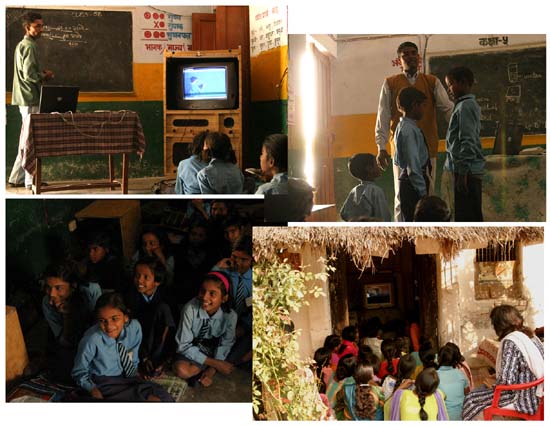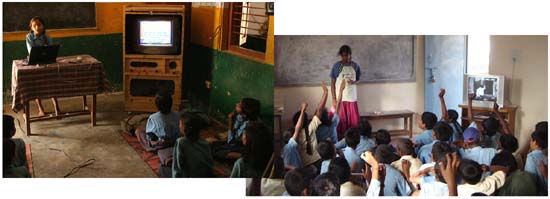Mediation-Based Pedagogy
The principal means of disseminating the content in the DSH database is shipping DVDs to spoke schools. Each spoke school is given at least a TV and a DVD player. (Many schools also need a big lead-acid battery and a DC-to-AC inverter for dealing with intermittent power supply.) An obvious question is whether kids can learn by just watching TV. The short answer is no. The longer answer concerns pedagogy.
Put simply, "mediation-based pedagogy" refers to the need of placing a teacher (or a "mediator") in between the students and the TV. The mediator periodically pauses the video and engages the students in various activities based on what has just occurred on TV. These activities may include asking questions, inviting kids to do board work, and organizing role-playing activities. The mediator's job is to make his or her class as lively, dynamic, and interactive as the one conducted by the model teacher on TV. In effect, the video and the mediator form a "team:" the video provides an example, a framework, a lesson plan, and a content and methodology model; while the mediator, who may not be highly skilled in some domain-specific knowledge, supplies the crucial interactive element.

Another variation of the theme is "peer-mediation," the approach of recruiting the brightest fellow students to serve as mediators during periods when the local teachers are absent, which are common occurrences in government schools in India. In our experience, the student mediators appear to universally display a high degree of responsibility and enthusiasm when they are put in charge.
The highly motivated teachers can also study the supplied videos on their own, ahead of the live classes. Without DSH, such motivated teachers do not have an effective means of self-improvement; with DSH, a path is open to them as long as they are willing to work hard. This path leads to a best-case scenario, when we end up "graduating" the teachers, who may indeed choose to cast aside the live mediation crutch and become more effective teachers in their own right. In traditional teacher training workshops that last just a few days, the short duration necessitates that the topics covered must be kept at an abstract level, and it is not always clear how such abstract principles should relate to many of the daily topics. In DSH, the videos carried home by the participating teachers provide an ongoing and highly specific training: the local teachers learn by observing the best model teachers in action day-in and day-out, and they learn by doing. So this mode of training has the potential of being much more effective.
In short, the focus of DSH is not to replace people; instead, it is about amplifying the reach and the power of the relatively small number of the skilled teachers, and to train and empower the less skilled teachers. In this sense, DSH is foremost a "people system," not just a computer- or network-system.